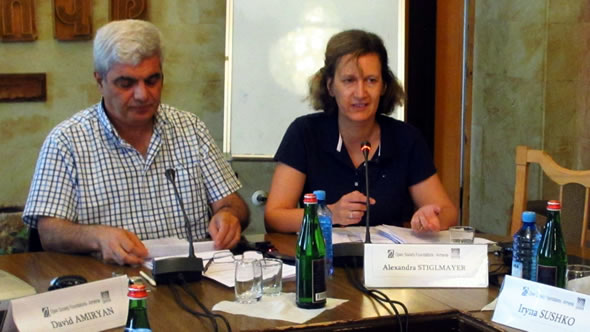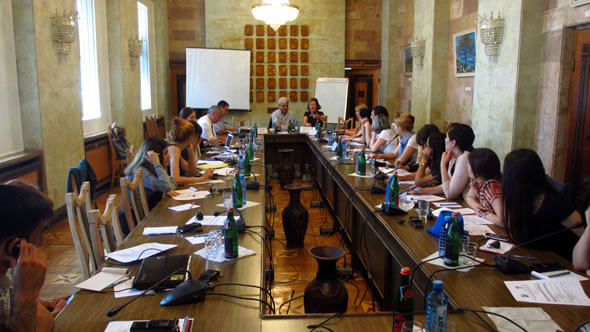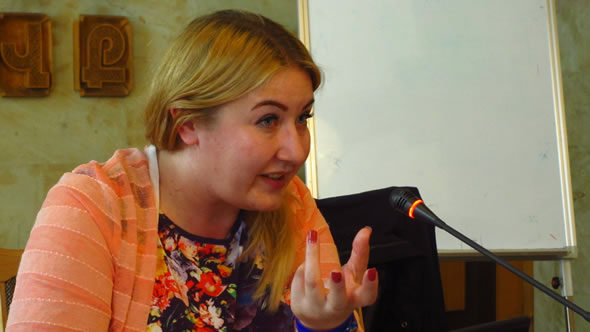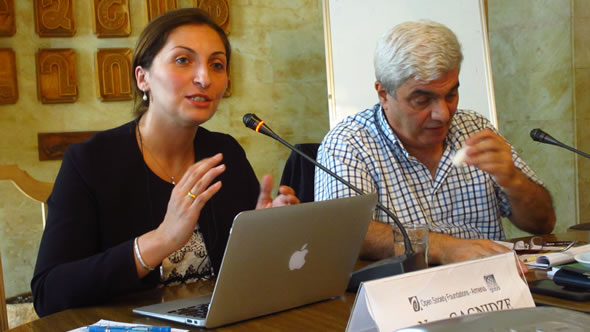Yerevan – ESI discusses visa liberalisation process for Armenia

ESI Senior Analyst Alexandra Stiglmayer participated in a conference on 15 July in Yerevan, and a workshop on 16-17 July in Tsakhkadzor, on the topic of EU-Armenia relations and visa-free travel for Armenia. Both were organised by the Analytical Centre on Globalisation and Regional Cooperation (ACGRC) and the Open Society Foundations Armenia under the title: "EU-Armenia Relations in the Context of Visa Facilitation and the Experience of other Eastern Partnership States".
At both events, Alexandra outlined the advantages of visa-free travel, which include more people-to-people contacts, the opportunity for Armenians to get to know the EU, and the potential to increase trade since it will be easier for businesspeople to establish contacts in the EU. She also emphasised the benefits of the reforms that an EU-led visa liberalisation process requires. These include, among many others, a modernisation of the border management and migration management systems, stronger efforts to fight corruption and organised crime, greater respect for human rights, and the establishment of an asylum system in line with international standards. She said a visa liberalisation process is very concrete, reform-oriented and structured; and that it would give the Armenian government and the EU the opportunity to work together closely and overcome the uncertainties that Armenia's decision in 2013 not to sign an association agreement with the EU had created. Alexandra also talked about the important role of civil society organisations in EU visa liberalisation processes and relayed the experience of Western Balkan countries and Moldova.
Other speakers at both events included Stepan Grigoryan, the ACGRC chairman; and Iryna Sushko, Director of the Ukrainian NGO Europe without Barriers, and Nato Gagnidze, Director of the Georgian NGO Innovations and Reforms Centre, who spoke about their countries' experience with visa liberalisation. The conference of 15 July was also addressed by Deputy Foreign Minister Garen Nazanian, the head of the EU Delegation in Armenia Piotr Switalski and OSF director Larisa Minasyan. The workshop on 16/17 July brought together civil society organisations that work on topics which are part of a visa liberalisation process such as human rights and the fight against corruption. (See agendas below.)
In 2009, the EU offered all six Eastern Partnership countries (Armenia, Azerbaijan, Belarus, Georgia, Moldova and Ukraine) the perspective of visa liberalisation. This has been conditional on the conclusion of visa facilitation and readmission agreements as a first step, followed by the fulfilment of conditions that a visa liberalisation action plan (VLAP) sets out. Moldova was the first country to successfully complete the process and see the visa requirement lifted in April 2014. Georgia and Ukraine have also met all the VLAP conditions and the European Commission proposed on 9 March 2016 to lift the visa requirement for Georgia, and on 20 April 2016 to do the same for Ukraine. The proposals now need to be adopted by the European Parliament and the Council.
The EU-Armenia visa facilitation and readmission agreements entered into force in January 2014, but so far no visa liberalisation process based on a VLAP has been launched. EU-Armenia relations are still recovering from the abrupt decision by the Armenian government in September 2013, forced by Russia, not to sign an association agreement and a "deep and comprehensive" free trade agreement with the EU, but to join the Russian-led Eurasian Economic Union. More recently, however, the Armenian government has urged the launch of a visa liberalisation process, which has the full support of Armenia's civil society. At the conference on 15 July, Deputy Foreign Minister Garen Nazanian repeated this call. While the EU, faced with an unprecedented refugee crisis and the pending decisions to lift the visa requirement for Ukraine and Georgia, as well as for Turkey and Kosovo if these two countries meet a few remaining conditions, is in no hurry to launch the process, it has signalled its willingness to do so in 2017. In ESI's opinion, it should do so earlier.
- Agenda for the conference on 15 July
- Agenda for the workshop on 16/17 July
- ESI website on visa liberalisation: Europe's Border Revolution and the Schengen White List Project



